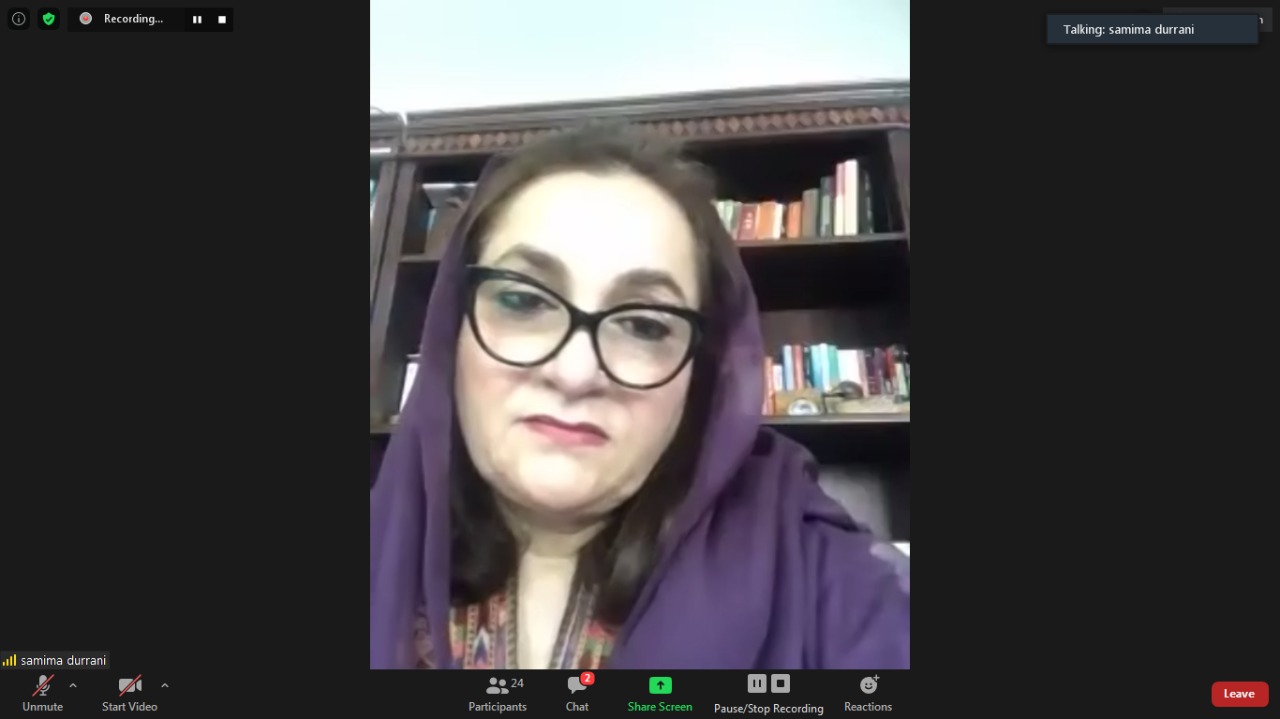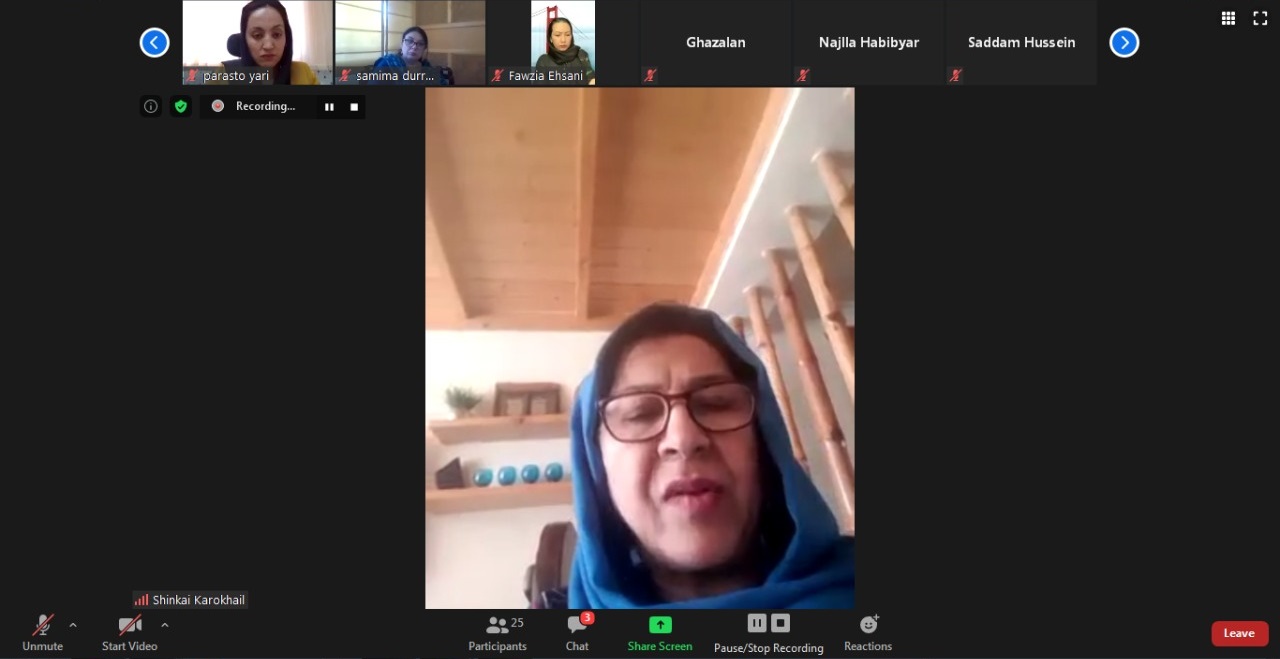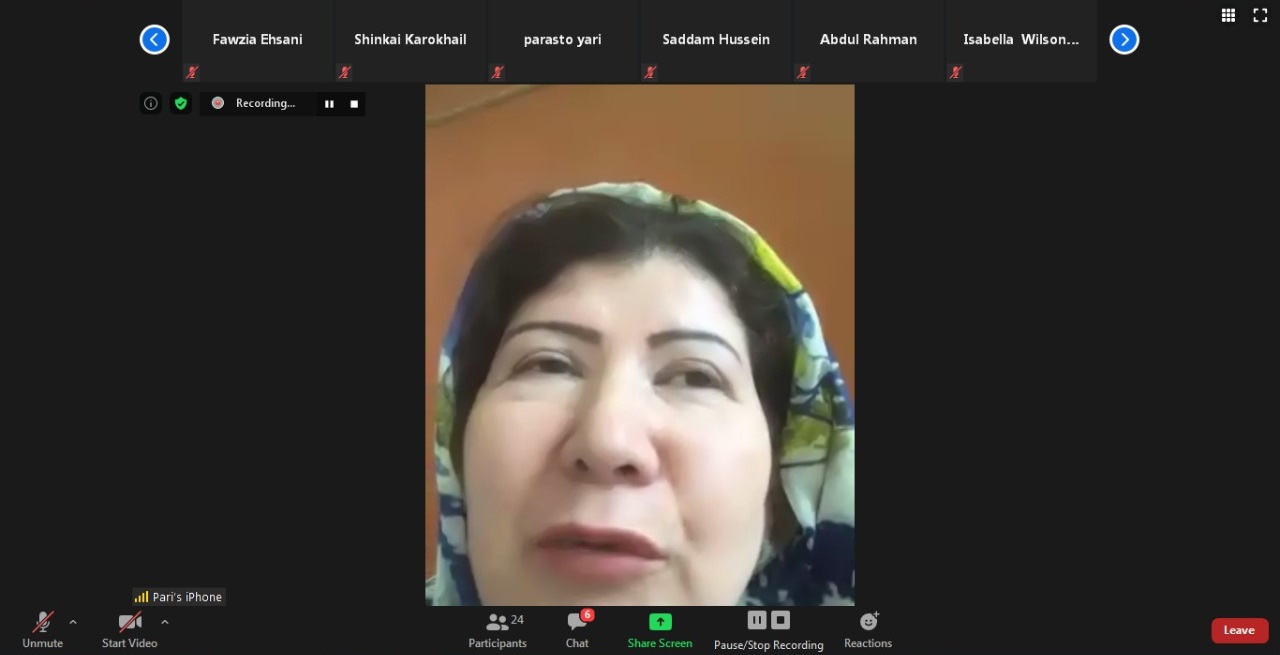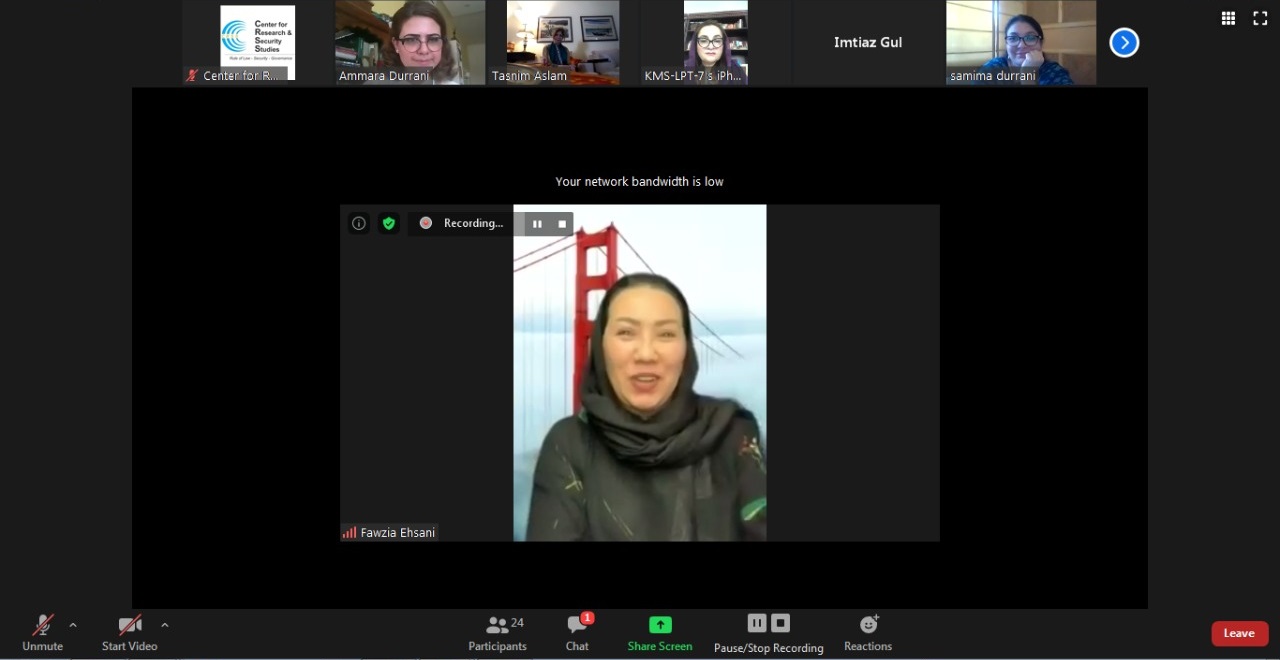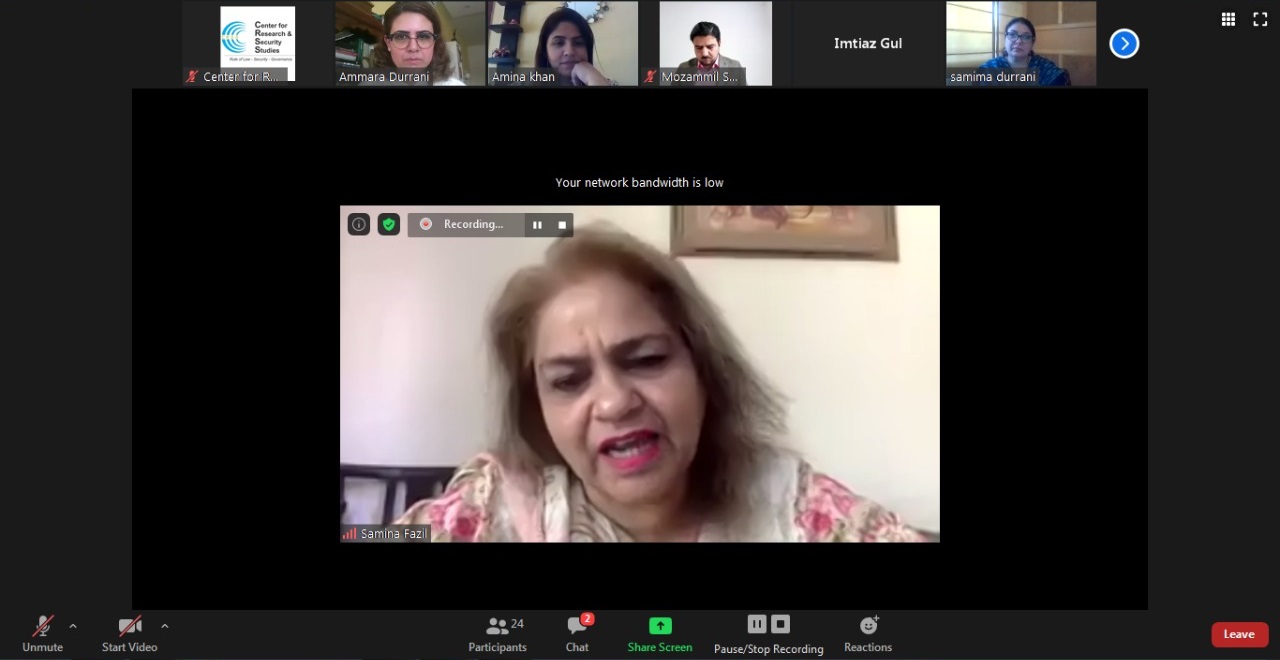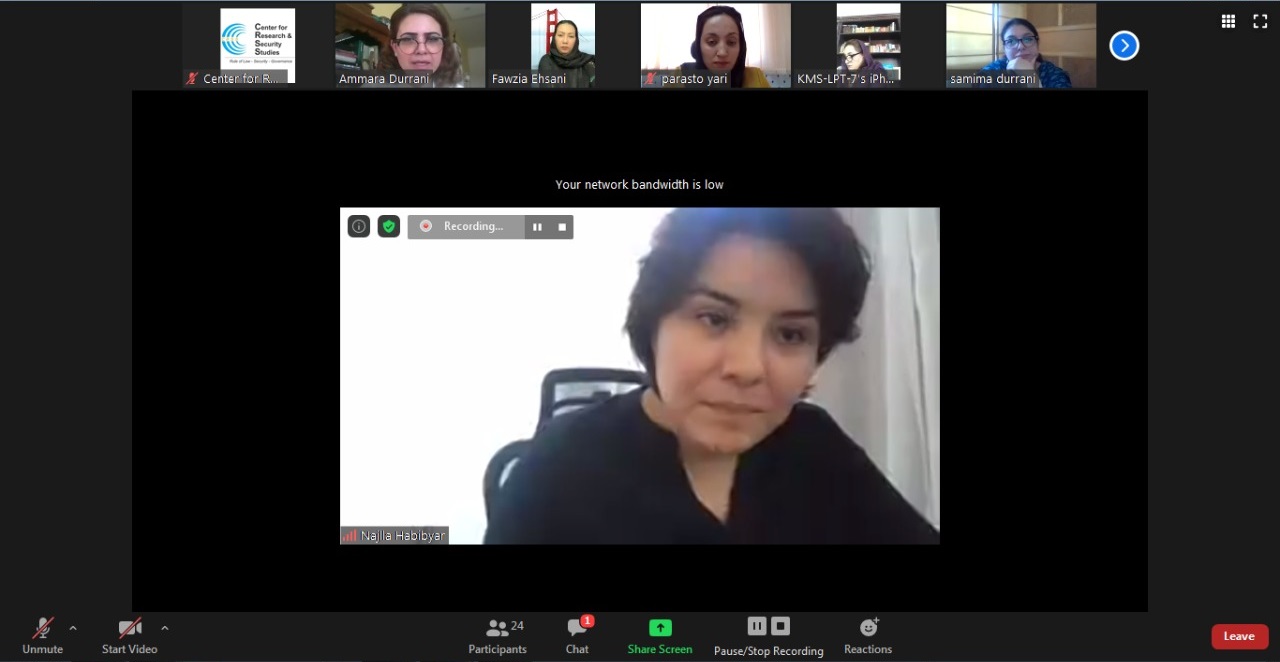In continuation of its ongoing women-led exchanges as part of its Pakistan-Afghanistan Track 1.5/II diplomacy – Beyond Boundaries, the Center for Research and Security Studies (CRSS), in collaboration with its Afghan counterpart, Organization for Economic Studies and Peace (OESP), organized a virtual Pak-Afghan Women Leaders Conference on June 15, 2020 on the theme, “Socio-Economic Impact of COVID-19 on Women in Pakistan and Afghanistan”.
A nine-member Afghan women leaders’ delegation, led by Member of Parliament, Ms. Shinkai Karokhail, included Shukria Barakzai, Former Ambassador to Norway; Fawzia Ehsani, Former Deputy Minister for Transport and Civil Aviation; Momina Yari, Former Commissioner, Afghan Independent Election Commission; Parwarish Oriakhail, Vice President, Afghanistan Women Chamber of Commerce and Industry (AWCCI); Parasto Yari, Senior Advisor to Minister for Peace; Ghazalan Koofi, Director General, Statistics Affairs; Freshta Zuhal Rahman, Commercial Attorney and Zahra Formuly, Media Representative (RTA).
Pakistan’s women-led delegation, headed by Member of National Assembly, Ms. Mehnaz Akber Aziz, included Ambassador Tasnim Aslam, Former Special Secretary of the Ministry of Foreign Affairs; Samina Fazil, Founder and President of Islamabad Women Chamber of Commerce and Industry (IWCCI); Dr. Shabana Fayyaz, Head, Department of Defense and Strategic Studies (DSS), Quaid-i-Azam University; Sameena Durrani, Senior Development Professional; Ammara Durrani, Public Policy and Human Security Expert; Amina Khan, Director, Centre for Middle East & Africa (CMEA) and Afghanistan, Institute of Strategic Studies Islamabad (ISSI); Mome Saleem, Development Professional and Consultant, PM Youth Programme, and Samima Durrani, Development Professional and Independent Consultant. At the end, the delegates came up with joint policy recommendations.
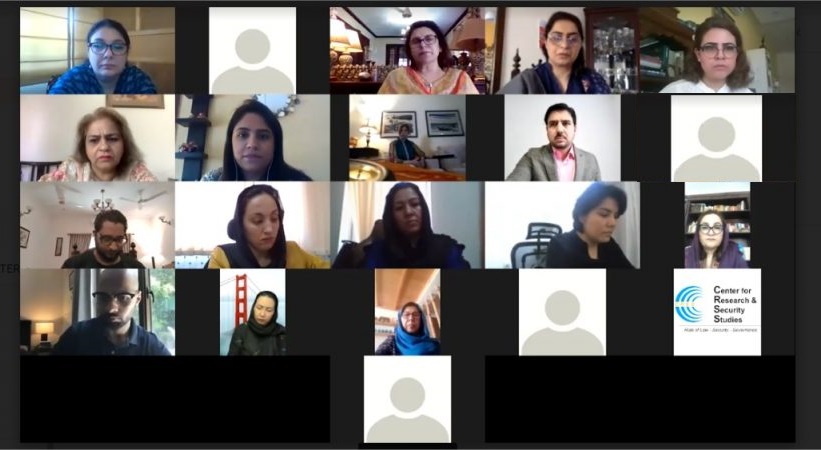 At the outset, CRSS Executive Director Imtiaz Gul welcomed both delegations to the forum and stated that adding the women component in Beyond Boundaries is a good way of building on what CRSS has been doing since 2015. He stated that while the politics remains toxic and most of the leaders keep clinging to the baggage of history, we at the civil society should at least try to detach from official narratives. Instead, we should mine on positives to generate significant goodwill and resolve bilateral issues together in a positive environment, he added.
At the outset, CRSS Executive Director Imtiaz Gul welcomed both delegations to the forum and stated that adding the women component in Beyond Boundaries is a good way of building on what CRSS has been doing since 2015. He stated that while the politics remains toxic and most of the leaders keep clinging to the baggage of history, we at the civil society should at least try to detach from official narratives. Instead, we should mine on positives to generate significant goodwill and resolve bilateral issues together in a positive environment, he added.
Mehnaz Akber Aziz, Member of Parliament and head of the Pakistan women leaders group, in her keynote address, welcomed the Afghan women leaders warmly. She began with sharing an encouraging news regarding Afghan President Ghani, who recently said that Afghanistan now has “the closest alignment” with Pakistan on the peace process and he also hoped that it would translate into cooperation in other areas as well. Commenting on the recent appointment of Ambassador Sadiq as PM’s Special Representative on Afghan Affairs, Ms. Aziz was of the opinion that additionally appointing a woman co-ambassador or deputy ambassador would be a tangible gain. This would help in resolving women related issues across the border in a swift manner. Commenting on the global pandemic, she said that for COVID-19 approaches to be responsive and to address the gendered impact, women must be at the center of COVID-19 recovery efforts. This starts with women’s equal representation and participation in decision-making. She also suggested formulation of a Pak-Afghan working group on COVID-19.
Shinkai Karokhail, senior Afghan politician and rights activist and head of the Afghan women leaders, stated that COVID-19’s impact has doubled or tripled women’s responsibilities in Afghanistan and it will slow down the access of girls to education even more. It is feared that because of the economic impact of COVID-19, families will further prioritize educating boys rather than girls which will increase the number of out of school female students. Online learning is better than nothing, she stated; but it has created a digital divide. People who have access to these devices can benefit, but the majority of the students in rural areas do not have access to computers or TVs and internet.
She further stated that the pandemic has also added to the miseries of Afghan women, who are often working in the informal sector. Now, they are at the verge of losing their jobs; a large number of whom are widows. Besides that, these women also face physical and psychological abuse. She also recommended that a mechanism be devised for Afghan women entrepreneurs to learn the techniques of e-commerce from Pakistani businesswomen. She added that the COVID-19 crisis represents an opportunity to empower women as key leaders and decision makers to respond effectively and to build longer-term resilience and social cohesion of communities. Lack of diversity and failing to leverage women’s expertise and talent in decision-making can limit an effective response.
Following their keynote speeches, a comprehensive interactive discussion on the socio-economic impact of COVID-19 on women in both countries was kicked off which was moderated by Ammara Durrani, along with the CRSS team, during which women delegates from both countries proposed policy recommendations. The sub-themes of the discussion included 1) Education in Times of COVID-19 Pandemic: Issues and Opportunities for Girls, 2) Impact on Women’s Businesses and Employment: Exploring New Avenues Amid COVID-19, 3) Women’s Physical and Mental Health vis-à-vis COVID-19 and 4) Recent Developments in Afghan Peace Process: Future for Afghan Women?
On the education side, delegates raised several challenges being faced by women, including their lack of access to internet for academic material as well as their responsibilities at home, including helping their children study online. On the higher education side, OESP’s Executive Director, Mozammil Shinwari, stated that Pakistan has good experience in distant learning such as Virtual University and Allama Iqbal Open University of Pakistan. Recently, Pakistan also started Tele-School amid the pandemic. So, Kabul can get technical assistance from Islamabad regarding remote education.
Momina Yari; Former Commissioner, Afghan Independent Election Commission, affirmed that COVID-19 had badly affected the situation of women in both countries, particularly the girls’ education, employment and business opportunities in Afghanistan. She stated that as Afghanistan is a war-torn country, the Afghan women need the Pakistani women to share their experiences and solutions. Regarding online education, she stated that while they have this option in the urban areas, there is no access to internet in the villages.
Seconding her view, Fawzia Ehsani; Former Afghan Deputy Minister for Transport and Civil Aviation, shared that as a university lecturer in Afghanistan, she also witnessed the lack of access to internet as the major cause for girls being deprived of academic material. She stated that as girls previously relied on libraries for these resources, which are now closed, the academic material is only available online now, and because of poor internet connectivity, the students cannot access them. In this regard, Dr. Shabana Fayyaz; Head of the Department of Defense and Strategic Studies, Quaid-i-Azam University also proposed combining the traditional model of education using books with digital resources to empower women to continue with their education during the pandemic.
With regards to employment and business opportunities, Samina Fazil, Founder and President of Islamabad Women Chamber of Commerce and Industry (IWCCI), stated that all businesses for women in particular were closed in Pakistan due to COVID-19 as most Pakistani women relied on exhibitions to promote their businesses. She stated that unfortunately most of these women are not well trained to use digital platforms, such as Facebook, to do their businesses online. She stated that the IWCCI had started training sessions on Zoom sessions on how to use the social media for e-commerce. She extended IWCCI’s offer to provide e-commerce training services, particularly on how to digitize businesses using online platforms to Afghan businesswomen in order to enhance their skill development and help expand their businesses. She proposed to engage directly with Afghanistan Women Chamber of Commerce & Industry (AWCCI) in holding such training sessions.
Parwarish Oryakhail; Vice President of Afghanistan Women Chamber of Commerce & Industry (AWCCI), while sharing findings from a survey conducted by AWCCI, stated that businesswomen in Afghanistan had indeed been badly hit by COVID-19 where only 19/110 women businesses that the survey reached in different provinces of the country had continued their ventures through March 2020. Recalling her meeting with IWCCI’s Vice President, Ms. Afsheen Zeeshan, at CRSS’ Youth Entrepreneurs Conference held in mid February 2020 in Islamabad, Ms. Oryakhail stated that she and Ms. Zeeshan had agreed to sign an MoU between AWCCI and IWCCI to connect women businesses, make use of trade opportunities and further collaborations from both sides. The MoU, she stated, has yet to be signed. To this Ms. Fazil stated that she would follow-up with Ms. Oryakhail and AWCCI and IWCCI would sign the agreement.
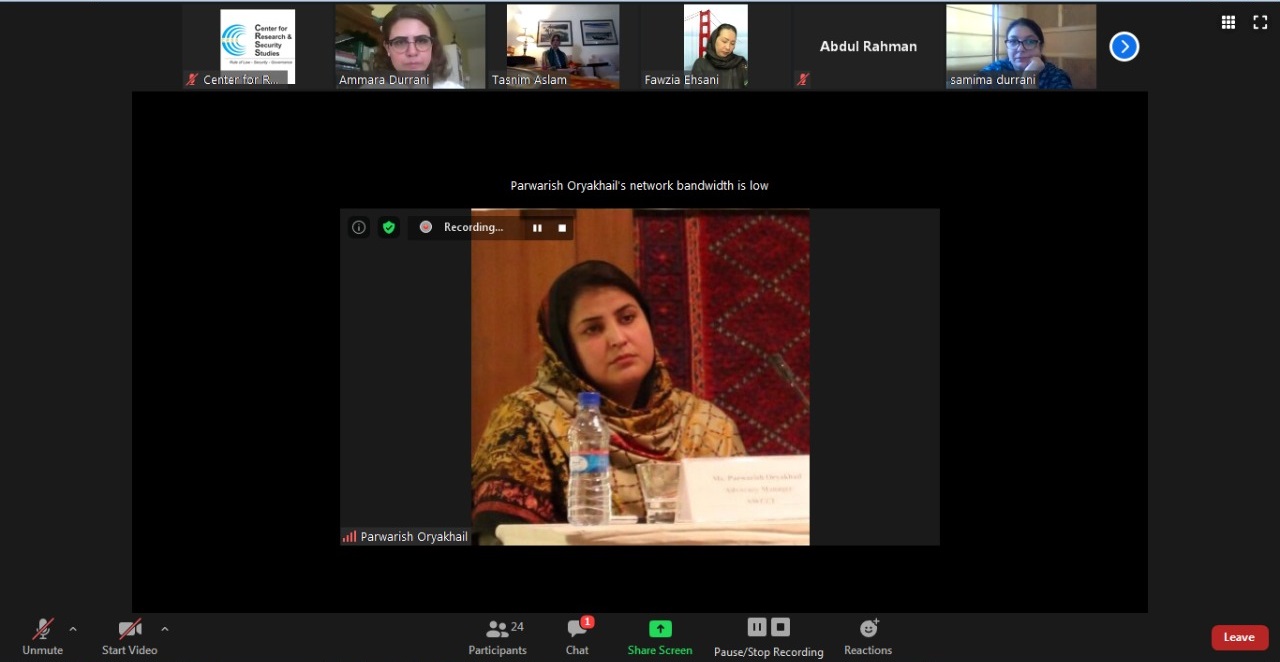 On the role of women in the Afghan peace process and in the future of Afghanistan following a possible political settlement, Parasto Yari; Senior Advisor to Minister for Peace, Afghanistan, stated that currently, there is limited women representation in the peace process. Delegates stressed that there should be an increase in the inclusion of women leaders/activists for their first-hand representation as they constitute 48% of the Afghan population and can best voice their issues on their behalf. In this regard, Amina Khan; Director, CMEA & Afghanistan, at the Institute of Strategic Studies Islamabad (ISSI), suggested that to fully represent women in the peace process, women activists from all sectors of the Afghan society need to be engaged. It is only through an inclusive participation of women in the intra-Afghan talks, that complex issues faced by women can be raised and addressed, she said. Furthermore, delegates also stated that there should be women representation from the Taliban’s side as well in the intra-Afghan talks to include their voices. This way women can have a say in pushing for ceasefire and putting a halt to violence as ultimately they are the biggest victims of the continuing conflict.
On the role of women in the Afghan peace process and in the future of Afghanistan following a possible political settlement, Parasto Yari; Senior Advisor to Minister for Peace, Afghanistan, stated that currently, there is limited women representation in the peace process. Delegates stressed that there should be an increase in the inclusion of women leaders/activists for their first-hand representation as they constitute 48% of the Afghan population and can best voice their issues on their behalf. In this regard, Amina Khan; Director, CMEA & Afghanistan, at the Institute of Strategic Studies Islamabad (ISSI), suggested that to fully represent women in the peace process, women activists from all sectors of the Afghan society need to be engaged. It is only through an inclusive participation of women in the intra-Afghan talks, that complex issues faced by women can be raised and addressed, she said. Furthermore, delegates also stated that there should be women representation from the Taliban’s side as well in the intra-Afghan talks to include their voices. This way women can have a say in pushing for ceasefire and putting a halt to violence as ultimately they are the biggest victims of the continuing conflict.
On the issue of meeting the needs of women’s health in the current situation of COVID-19, delegates proposed raising personal and household hygiene awareness by government agencies, media, civil society platforms and donor organizations. In addition, they suggested providing personal hygiene kits to those in need.
Furthermore, Momina Yari from Afghanistan stated that, due to the pandemic and the consequent lockdown, domestic abuse at the hands of the male figures in the house has been on the rise in Afghanistan. This has affected the family life of the women greatly and also added to their psychological trauma. This is aggravated by the fact that women shelters where women could seek help and asylum are now also closed due to the lockdown. While COVID-19 may be on the rise, it is not impacting families as much as domestic abuse. Ms. Yari thus called on the Ministry of Women Affairs to look into this matter.
While the issue is being faced globally, Pakistan’s delegates suggested that the females in Afghanistan can also avail the e-medical and psychotherapy services provided by online platforms in Pakistan to get help and awareness on how to deal in this difficult time. Also, Afghanistan can adopt the same model on their online platforms. Delegates stressed that civil society organizations in Afghanistan in collaboration with the civil society organizations in Pakistan could work together for this objective particularly and raise awareness on how to tackle it.
As stressed by many delegates during the discussion, the forum concluded with the need to formulate of a Pak-Afghan Bilateral Women Commission in which women leaders from all sectors come together to address and resolve current challenges faced by women in both countries through collaborative measures via this platform. Shinkai Karokhail from Afghanistan highly emphasized on creating a technical pressure group between women leaders of Afghanistan and Pakistan at the parliament level during and post COVID-19 to come up with policy recommendations from all sectors and propose them in the parliament. OESP Executive Director, Mozammil Shinwari, commended on the women delegates’ recommendation to set up a women parliamentarians caucus, urging Ms. Shinkai Karokhail from Afghanistan and Ms. Mehnaz Akber Aziz to collaborate in this matter.
Ammara Durrani; a public policy and human security expert from Pakistan, stressed on the role the women can play in the civil society domain to build pressure on the executive side of policy making. Adding to Ms. Durrani’s view, Samima Durrani; Development Professional and Independent Consultant from Pakistan, advocated that the efforts of all civil society organizations at all levels, including the aspect of cross-generational engagement, should be integrated to build a stronger platform to address all socio-economic issues faced by women, instead of having scattered activities with limited impact. Mome Saleem, Development Professional and Consultant, PM Youth Programme, Pakistan, pointed out the role of the youth along with the role of the women, keeping in view Afghanistan as the youngest country in terms of its demographics in the entire region and Pakistan being the second. She proposed that the platform of CRSS can be used to engage the youth in unconventional skill development in this time for long-term policies, especially for young girls.
Najla Habibyar, Project Manager, OESP, from Afghanistan stated that until the women are committed to bring these changes, these recommendations would only remain limited to these forums. She further suggested starting awareness programs across both countries on how women can sustain their businesses, come up with solid suggestions for the health and education sectors, involving government officials and women lobbyists, and helping women gain access to finances. For this, she recommended the creation of a Trust Fund for women that will help them revive their activities, such as in businesses, that are affected by COVID-19 and even post-pandemic period.
At the end, Ammara Durrani, who was moderating on behalf of CRSS, commended the efforts of CRSS in setting such an important agenda for the women conference and hoped that the joint policy recommendations devised from the discussion (given in the tab below) will reach the relevant government institutions and be put into implementation. She also urged the civil society members to do their part in their capacity in moving towards the desired policy changes for women.

